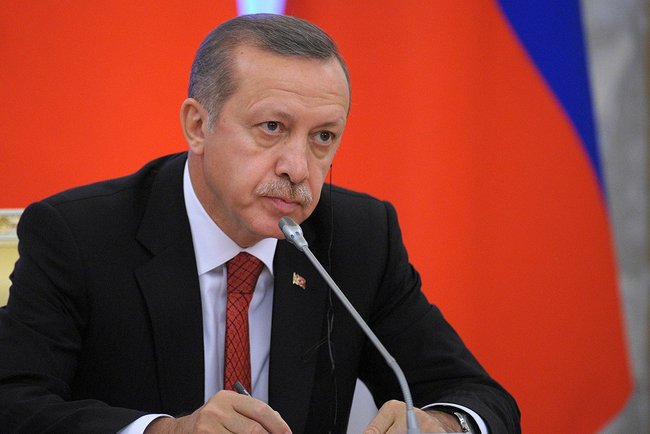Erdogan to Boycott iPhones as Turkey’s Feud With U.S. Escalates
By Onur Ant- Businesses and banks call on government to contain crisis
- Finance Minister Albayrak pledges steps to protect the lira

Turkey's Row With U.S. Escalates
President Recep Tayyip Erdogan vowed to boycott iPhones in a demonstration of defiance as the U.S. held firm to its demand that Turkey release an evangelical pastor and Turkish executives called for action to bolster the lira.
Erdogan said the nation of 80 million people would stop buying American electronics, condemning the "explicit economic attack" against his country. The lira lost a quarter of its value this month as Donald Trump doubled tariffs on Turkish steel and aluminum imports and slapped sanctions on two ministers. It rebounded on Tuesday as Turks sold dollars.
"There is a cost for those who are plotting the operation” against Turkey, Erdogan said in the first of two speeches in Ankara, without specifying when the boycott would start or how it would be enforced. Singling out the iPhone, he suggested Turks buy Samsung Electronics Co. or locally made Venus Vestel smartphones instead.
While even a widespread Turkish boycott would do little to dent U.S. economic interests, it shows Erdogan refusing to give in to market turmoil that’s pushed borrowing costs to record highs and threatens to descend the nation into a financial crisis.
Lira Rebounds
Erdogan’s boycott is reminiscent of the decision by President Vladimir Putin to ban food imports from countries that slapped sanctions on Russia in 2014 over its annexation of Crimea. The difference is that unlike Russia, the U.S. and Turkey are NATO members. Erdogan warned that the U.S. is putting decades-old alliances at risk and pushing Turkey to seek allies elsewhere.
While diplomatic tensions rage, the currency rallied for the first time in a week as Turks cashed in dollar savings to take advantage of the huge slump in the local currency. Speculation is also growing that Turkish policy makers will heed calls from corporate and banking executives to raise interest rates to stem the rout. The lira jumped 5.9 percent to 6.5028 per dollar by 6:03 p.m. in Istanbul.
Bonds also recovered, with the yield on 10-year notes falling 132 basis points to 21.37 percent. The cost of insuring the nation’s debt against default fell off 10-year highs.
‘Permanent Damage’
The latest attack on the economy showed that the dollar is no longer a "trustworthy" currency and is instead being used as a tool for political punishment, Finance Minister Berat Albayrak said at a conference in Ankara he as attending alongside Erdogan. "We’re going to continue to take steps to protect the lira," he said.
Tensions between the two NATO allies have intensified amid a dispute over the detention of Andrew Brunson, whom Turkey accuses of aiding a failed coup. Trump’s top national security aide warned Turkey’s ambassador on Monday that the U.S. has nothing further to negotiate until Brunson is freed, according to two people familiar with the matter.
Policy makers need to adopt a series of measures “so that the situation doesn’t make permanent damage to the real economy," the Union of Chambers and Commodities Exchanges of Turkey and the Turkish Industry and Business Association said in a joint statement.
Corporate Pressure
They called on the government to cut spending, improve ties with the European Union, bring to an end the spat with the U.S. and chart out a clear plan to bring inflation -- which soared to a 15-year high of almost 16 percent in July -- back to single digits permanently.
A similar plea came from the nation’s banks, including the second-largest by assets, Turkiye Garanti Bankasi AS. While Turkey’s central bank has raised lending rates by 500 basis points this year to 17.75 percent, it hasn’t acted since the latest turmoil began with U.S. sanctions on the interior and justice ministers on Aug. 1.
“Something has to be done about interest rates,” Ali Fuat Erbil, Turkiye Garanti’s chief executive officer, said in an interview aired by NTV. “Besides fiscal discipline, monetary tightening is the remedy. Is there need for that? Yes there is.”
While Erdogan didn’t address their concerns in his speeches on Tuesday, he suggested Turks have already begun responding to his call to convert foreign exchange into lira because it would be tantamount to "surrendering" if they did otherwise.
Citizens tend to have bank accounts in various currencies so how they move their money does have a meaningful impact on the lira’s trajectory. Local individuals and businesses sold an estimated $50 million to $60 million of foreign exchange on Tuesday morning, according to an Istanbul-based currency trader who declined to be named as they were not authorized to speak to the media.
— With assistance by Asli Kandemir, and Constantine Courcoulas
No comments:
Post a Comment